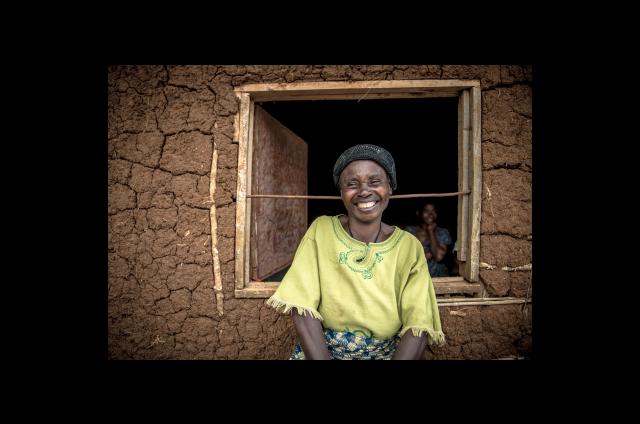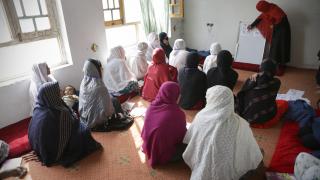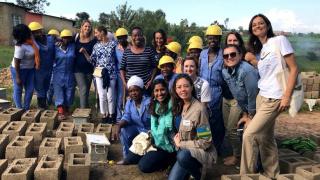16 Days of Activism Against Gender-Based Violence
Every year from the 25th November to the 10th December, the UN runs #16DaysofActivism Against Gender-Based Violence - an initiative aimed at promoting action against violence towards women and girls.
To mark the campaign, our Associate Director of Social Empowerment, Saba Ghori, explains how we are working to prevent gendered violence against women survivors of war.
What is violence against women?
Violence against women is violence that is directed against women and girls, based on the very fact of their gender. It is prevalent all around the world and across different religions, ethnic groups, and socioeconomic classes. The extent of the problem is huge; 1 in 3 women will experience some form of violence during her lifetime.
The root cause of violence against women is the unequal power dynamic between genders.
There are many different forms of violence against women. The most well-known forms are physical or sexual violence, but there is also economic violence, which is when someone tries to control your economic outlook such as the ability to work or to seek an education.
Another type of violence prevalent in the countries where we work are harmful traditional practices, which is violence directed against women and girls based on certain cultural or religious interpretations. This includes early and forced marriage, so-called “honor” crimes, and female genital mutilation.
The root cause of violence against women is the unequal power dynamic between genders. It’s all about power and control. Because of discrimination and their traditionally low status in society, women and girls are more vulnerable to violence.
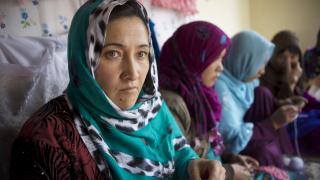
How does violence against women affect the women we serve?
Women living in conflict-affected countries are more susceptible to violence because the very social fabric of their country has been torn apart. After decades of war, there is often a climate of violence. People have lived through years of conflict, which leads to an environment where it’s seen as normal to abuse others.
Without a system to allow survivors to seek justice and to hold people accountable when they abuse others, violence goes unpunished.
Conflict and violence against women are closely linked. A recent study of women we work with in Afghanistan showed that women who have been exposed to conflict-related trauma are more likely to have experienced intimate partner violence in the previous 12 months (27% vs 17% the year prior) and are more likely to show symptoms of depression and/or post traumatic stress disorder.
Post-conflict countries also suffer from a lack of infrastructure and a lack of government services. This leads to impunity for perpetrators of violence. Without a system to allow survivors to seek justice and to hold people accountable when they abuse others, violence goes unpunished.
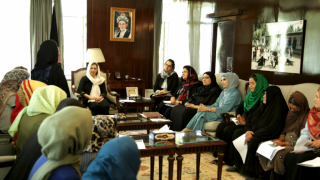
How does Women for Women International address violence against women?
The main way we address violence against women is through prevention. We promote awareness and educate both women and men to address the root cause of violence against women—gender inequality. Our 12-month programme helps prevent violence by providing women with opportunities for income generation, giving women knowledge of their rights and ensuring women have a chance to come together in a safe space and share their stories.
Our new curriculum defines what violence against women is, it talks about the different types of gender-based violence, the consequences, addresses myths about violence against women.
We recently updated our programme curriculum, to include more comprehensive information about violence against women. Our previous curriculum had included violence in the form of domestic violence and rape, and did not go beyond that.
Our new curriculum defines what violence against women is, it talks about the different types of gender-based violence, the consequences, addresses myths about violence against women. We have exercises where women identify the root causes and come up with solutions.
Since we are not able to provide direct specialist services to support women survivors of violence, so we have built strong partnerships with organisations who can offer psycho-social support, counselling, legal aid or shelter. We refer women who need these services to local organisations who can help.
What role do men play in preventing violence against women?
In 2002, we started our Men’s Engagement Programme at the request of women, who told us that they wanted the men in their communities to learn about women’s rights. The negative consequences of violence against women is one of the key topics that men learn about in all the countries where we work.
I recently met with some men in Nigeria who have taken part in our Men’s Engagement Programme. In the class, the trainer asked, ‘Who used to beat their wife?’. Half of the men reluctantly put up their hands. They all said that they felt ashamed and would not do this anymore. I asked why they had changed their minds, and they told me that they did not realise the harmful consequences for their family.
Some of the men also said they had not realised there was a law against intimate partner violence. Learning about the punishment they could receive helped to change their behaviour.
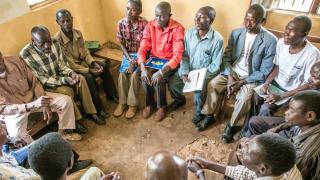
What is your message for the 16 Days of Activism against gender-based violence?
Violence against women is not just a problem ‘over there’, in countries affected by conflict. It affects all of us.
The 16 Days of Activism Against Gender-Based Violence is an opportunity for us to come together and focus on the issue of violence against women. We need to take stock of where we are, and what else needs to be done to take action against violence against women around the world. But it’s not just a problem for 16 days of the year – we should be addressing this every day!
Continue reading
Using skills learned in our “Change Agents Programme,” our graduates worked together with Women for Women International – Afghanistan and the Afghan Women’s Network to create an opportunity to advocate for women's rights and opportunities in rural Afghanistan.
In November 2017, Women on a Mission, a charity that champions women survivors of war around the world, visited our programme in Rwanda. Christine Amour Levar, Co-Founder of Women on a Mission, writes about their experience.
"Building a personal connection with my sponsor sister, Amela, became a source of strength for me." Our Executive Director, Brita Fernandez Schmidt shares the story of meeting her first sponsor sister and the very real impact of our programme.

